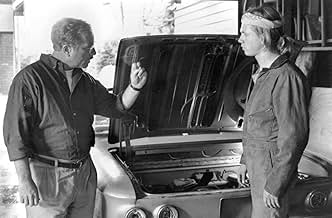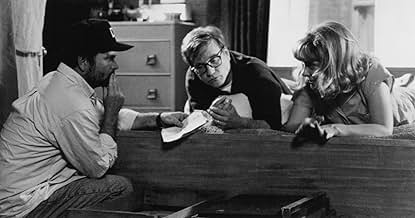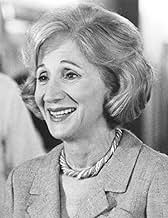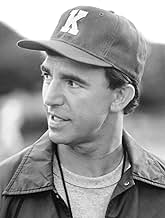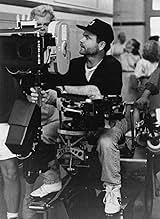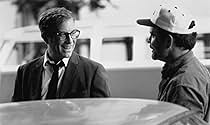Un compositor frustrado encuentra satisfacción como profesor de música de secundaria.Un compositor frustrado encuentra satisfacción como profesor de música de secundaria.Un compositor frustrado encuentra satisfacción como profesor de música de secundaria.
- Dirección
- Guión
- Reparto principal
- Nominado para 1 premio Óscar
- 5 premios y 5 nominaciones en total
- Vice Principal Wolters
- (as W.H. Macy)
Reseñas destacadas
1) "Playing the sunset" was Holland's way of getting Gertrude to relax so she could play the notes fluidly. They both knew that she didn't sound professional, and wasn't going to. The idea was to get her just above the level of making a fool of herself as she did the first time he called on her in class. Then she could, and did, perform in the band without dragging down the whole ensemble.
2) Her goal was not to be a professional musician. Did no one else hear her speech about "I just wanted to be good at *something*"? She listed all the fabulous achievements of her parents and siblings, and concluded, "I'm the only one who's..." The missing word would have been "useless" or "worthless". Or "a failure". Thirty years later she's the governor (not the mayor!), because in 1966, Holland helped her gain confidence for the first time.
3) She wasn't "wasting" Holland's efforts by going into politics. Art, music and theater education don't exist solely to create professional artists, musicians and actors. They also exist to give young people an opportunity for change and growth, even if they never use a paintbrush again.
I liked that plot twist. Almost every high school has an alumnus who has achieved something in art or entertainment, but a lot of people sell one painting or appear in one film and become a hero to their home town. But there are only fifty states, and it takes an extraordinary amount of drive to become governor of one of them. It's unlikely that she would have taken that first step towards empowerment without Holland.
Mr. Holland has a dream of composing a very memorable and moving symphony, and to ultimately be "rich and famous." But working odd jobs in pursuit of his dream doesn't appeal to him. Reluctantly, he takes a day job as a high school music teacher to support the family and at first hates it. His students are not motivated to learn through readings and tests, and do not respond well to the music of Bach. When he finds they love rock and roll, he integrates this into the curriculum, much of the disapproval of the administration, who believe "rock and roll by its very nature leads to a breakdown in discipline." He teaches and mentors many students over the years, from a clarinet student who doubts her talent and feels inferior to her musically talented family, to a wrestler who becomes a drummer, and a talented singer with her eye on him who wants to go to Broadway despite any barriers. Whether or not he knows it, Mr. Holland inspires them to do something worthwhile.
Despite his love and talent for teaching, Mr. Holland cannot develop this same level of rapport and love with his wife Iris and son Cole, who is deaf. His desire for Cole to appreciate music is outweighed by Cole's inability to hear and his father's reluctance to help him. Cole learns sign language from his teachers and mother predominantly. Mr. Holland appears to be the kind of person who detests imperfection of any kind, and this strains his familial relationships. Gradually, though, he learns to accept and deal with these challenges, and becomes more loving and appreciative.
I recommend "Mr. Holland's Opus" for musicians, singers, music teachers, and really everyone. Enjoy the show!
¿Sabías que...?
- CuriosidadesEvery person in the film that portrayed a deaf person is deaf in real life.
- PifiasMr. Holland plays "Lovers Concerto" to his class and asks who wrote It. A student replies, 'The Toys'. Mr. Holland corrects him and says, "That was Minuet in G, by Johann Sebastian Bach." At the time the film was set, this was attributed to Bach, as it was included in a notebook Bach gave to his wife. It was determined in 1979 to be part of a larger piece written by Christian Petzold (1677-1733).
- Citas
Adult Gertrude Lang: Mr. Holland had a profound influence on my life and on a lot of lives I know. But I have a feeling that he considers a great part of his own life misspent. Rumor had it he was always working on this symphony of his. And this was going to make him famous, rich, probably both. But Mr. Holland isn't rich and he isn't famous, at least not outside of our little town. So it might be easy for him to think himself a failure. But he would be wrong, because I think that he's achieved a success far beyond riches and fame. Look around you. There is not a life in this room that you have not touched, and each of us is a better person because of you. We are your symphony Mr. Holland. We are the melodies and the notes of your opus. We are the music of your life.
- Créditos adicionalesThanks to The Seattle Symphony Orchestra
- Banda sonoraOne, Two, Three
Written by Brian Holland, Lamont Dozier, Eddie Holland (as Edward Holland), John Madara, Dave White, and Len Barry (as Leonard Borisoff)
Performed by Len Barry
Courtesy of MCA Records
Selecciones populares
- How long is Mr. Holland's Opus?Con tecnología de Alexa
Detalles
- Fecha de lanzamiento
- País de origen
- Idiomas
- Títulos en diferentes países
- La simfonia del professor Holland
- Localizaciones del rodaje
- Empresas productoras
- Ver más compañías en los créditos en IMDbPro
Taquilla
- Presupuesto
- 23.000.000 US$ (estimación)
- Recaudación en Estados Unidos y Canadá
- 82.569.971 US$
- Fin de semana de estreno en EE. UU. y Canadá
- 14.466 US$
- 1 ene 1996
- Recaudación en todo el mundo
- 106.269.971 US$
- Duración
- 2h 24min(144 min)
- Color
- Mezcla de sonido
- Relación de aspecto
- 2.35 : 1


